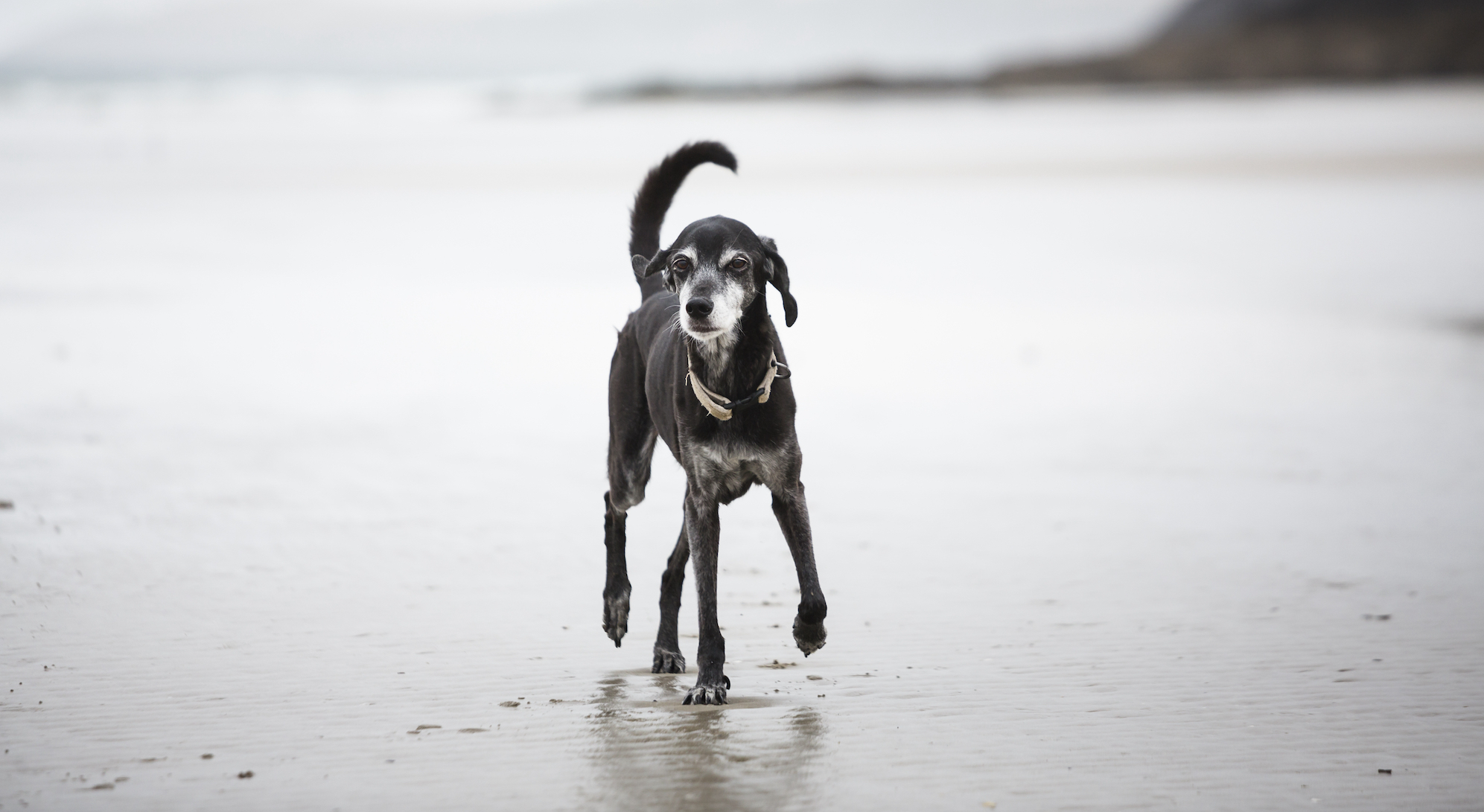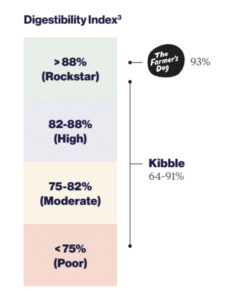As you mind your dog’s daily mealtime and potty schedule, you might wonder: how long does it take for their breakfast to pass through their body and end up as waste? The time needed to digest food depends on many factors, including size, age, activity level and food type. In dogs, the digestion process can take anywhere from four to 12 hours.
It’s worth understanding your dog’s digestive process as it’s such a key component of their overall health. This system has many vital functions, including taking in food, breaking the food down and absorbing the nutrients, taking in and absorbing water and electrolytes (essential minerals that help your dog’s body operate normally), and getting rid of waste products. The microorganisms that reside in the digestive tract even play a role in immune function. A tip-top digestive system not only makes for healthy poops; it’s essential for your dog’s happiness and well-being.
Read on for a run-down on the digestive process, how long it should typically take for food to go from the mouth to your poop bag, and how to look out for your dog’s digestive health.
What is digestion?
Digestion is the process of breaking food down into nutrients that can be absorbed by the walls of the intestines and gut. It’s achieved through two intertwined processes: mechanical digestion and chemical digestion. Mechanical digestion means the physical breakdown of food into smaller particles; it takes place largely in the mouth, but also involves the contractions of the stomach, esophagus and intestines. Chemical digestion is the process by which acids and enzymes further break food down into compounds that can be absorbed by the body; it takes place in the stomach and throughout the digestive tract. As the food passes through your dog’s small and large intestines, nutrients and fluids are absorbed into their body, leaving indigestible materials to be disposed of as feces.
The digestive system as a whole includes your dog’s mouth, esophagus, stomach, small intestine and large intestine, rectum, and anus. The liver and pancreas provide additional fluids and compounds that help break down food into absorbable nutrients.
How long does it take for dogs to digest food?
Generally, dogs take from four to eight hours to digest food, but could take up to 12 hours, depending on a number of factors, including the breed or size of dog, the type of food being consumed, exercise, and the gut microbiome.
Note that this time refers to the entire digestion process, from consuming food to eliminating; it doesn’t just refer to the time it takes for food to leave the stomach.
How does canine digestion time compare to human digestion?
In dogs, there is “slower gastric emptying in the fed state, faster small intestine transit, and higher and more variable intestinal pH…compared with humans.” That means dogs keep more food in their stomach for longer—this makes sense when you consider that dogs’ systems were designed to handle large volumes of food that they “wolf down” quickly—but move food through their intestines faster. So, overall, dogs digest food quicker than humans—you will take anywhere from 24 to 72 hours to fully digest your food vs dogs’ four to 12.
Factors influencing digestion time
Breed and size: Your dog may take more or less time to digest food depending on the type of dog they are. Larger dogs tend to take longer to digest food than smaller dogs. It’s believed that different breeds may also digest food at different speeds, though different studies on breed and digestion have yielded varying results.
Type of food: The time taken to digest food also depends on what type of food it is and the form in which it’s provided. Dry food can take longer to digest than whole, fresh food.
Some types of food have a higher digestibility quotient than others—and we’ll talk more about digestibility below.
Age: Your dog’s age may or may not play a role in digestion time. Puppies may digest food faster while senior dogs may take more time to digest.
Gut microbiome: Microbiome refers to all the bacteria and other microorganisms that live in your dog’s digestive system. These organisms provide many services to your dog, including boosting immunity, protecting against “bad” bugs—and helping with digestion. Given this, the time it takes your dog to digest food depends in no small part on what types of bacteria they have living in their gut. Healthy gut microbiomes have a complex population of different bacteria, each doing a different job.
Is my dog’s food “going right through them?”
The short answer is no, if your dog just ate and then a few minutes later they poop, that does NOT mean they are warp-speed digesters. Again, digestion takes four to 12 hours and if you’re seeing a poop right after dinner it’s typically indicative of something called gastrocolic reflex. In humans and in dogs, sometimes after eating, the actions of the stomach can trigger the colon to give a nudge to any waste that’s hanging out there.
However, if you’re seeing any sudden digestive irregularities, it’s worth paying attention. One or two rounds of diarrhea are typically nothing to worry about; but if you see digestive upset that lasts longer than that, or your dog seems uncomfortable when they poop, consult your vet.
Tips for promoting good digestion
Since digestion is such a key part of overall health, it’s a good idea to create the most favorable conditions for help your dog digest their food more completely and easily in many ways.
Exercise
A daily walk or game of catch doesn’t just keep you and your dog fit and happy, it also keeps the bowels moving. The physical changes that come with exercise—increased blood flow, heart rate, and muscle contractions—influence motility, or the movement of food through the digestive tract in a variety of ways, ensuring that the fecal matter doesn’t rest too long in the colon. So remember, if your dog isn’t moving enough, their bowels might not be either.
A stress-free environment
Stress is a common cause of digestive upset in dogs, and can result in a poop stoppage (constipation) or diarrhea. Watch your pup for signs that they might be upset, including changes in behavior and body language, barking and other signals that they’re anxious or otherwise not feeling their best. It’s always a good idea to look for ways to reduce the stress in your, and your dog’s, life (ideally those two goals are compatible!). Changes to routine (like a person who used to be around all the time suddenly leaving more often, which can lead to bouts of separation anxiety), a move, travel, and traumatic events are among the factors that can cause dogs to feel stressed.
Hydration
Water is essential to all aspects of your dog’s being, including digestion. Make sure your dog has access to clean water throughout the day. How much water they need per day varies by weight, exercise, diet, and other factors, but a general rule is that they should get about one ounce of water per pound of body weight. If your dog doesn’t seem inclined to drink enough water throughout the day, make sure you’re keeping their bowl clean, or even try changing the type of bowl you use.
A fresh diet also provides more of the food’s natural moisture than dry kibble. Whatever their daily diet, look for ways to give your dog water-packed, nutrient-rich treats and meal toppers, like blueberries, watermelon, celery, and leafy greens. These healthy food provide loads of water and fiber, both of which can help with digestion (make sure extras make up no more than 10% of your dog’s daily diet to prevent weight gain and nutritional imbalance).
Prebiotics and probiotics
Depending on your dog’s diet and other factors, it may be a good idea to support your dog’s digestion by supporting their microbiome, the bacteria that live in their gut. Prebiotics are foods that help feed healthy gut bacteria. Probiotics are bacteria known to help aid good digestion and come as a powder, pill, or food item. Be sure to speak to your vet about any supplements you give your dog, as the quality of these products (and how much live bacteria they actually contain) can vary wildly.
A healthy diet
Food, of course, is one of the biggest factors in keeping your dog’s digestive system running smoothly. Your dog’s daily diet must deliver the right amount and proportion of macro nutrients (protein, fat, and carbohydrates) and micro nutrients— (vitamins, minerals, and amino acids) to support all of your dog’s bodily functions. So a complete and balanced diet is essential. And so is fiber. The fiber that comes from plant sources in your dog’s diet is an all-round heath helper, and a key contributor to clockwork bowel movements. A diet of fresh food provides healthy, high-quality fiber in the form of fresh, whole vegetables like sweet potatoes, broccoli, green beans, and spinach.
Digestion and digestibility
Digestibility is a key, and sometimes overlooked indicator of a pet food’s quality. It’s not enough for a dog to consume sufficient nutrients; those nutrients have to be a absorbed by the body in a usable form instead of just “passing through.” Digestibility is, simply, how much of a food’s nutritional value can be absorbed into the bloodstream. You may have also seen the term “bioavailable,” a closely related term which means the proportion of a nutrient that enters the bloodstream and can be used by the body’s tissues.
Digestibility is typically measured through feeding tests—after a transition period, dogs are fed a set amount of a specific diet and their fecal matter is collected and analyzed. So, digestibility directly affects how much stool is produced each day.
A good guideline for measuring relative digestibility is as follows:
Less than 75% is poorly digestible/poor quality; 75 to 82% is moderately digestible/moderate quality; over 82% is highly digestible/high-quality; and above 88% is exceptionally digestible/exceptional quality.
So how digestible are some of the most common pet foods? And how does digestibility vary by food type?
Multiple studies have found that fresh, lightly cooked food has superior digestibility and bioavailability. The result is that your dog is actually getting the powerful nutrients from the food.
On the other hand, studies have proven that the process used to make commercial pet food reduces the food’s bioavailability. As one study concluded, the undesirable effects of extrusion (the process by which kibble is shaped into balls) include reduction of protein quality, decrease in palatability and loss of heat-sensitive vitamins.
One hallmark of a highly digestible diet is the “high quality poop.” A digestible diet will affect the quality and quantity of your dog’s poop—it’ll be less voluminous, and less stinky than their poop on a kibble diet. Poop aside, feeding fresh, digestible food can be a significant factor in your dog’s long-term health and wellness.
What to do if you find undigested chunks of food in your dog’s poop
Some foods won’t be digested by your dog for one reason or another, so seeing a small amount of some kinds of undigested food in your dog’s poop is not always cause for concern. As noted, fiber is a healthy part of a dog’s diet, and the fiber in foods like whole fruits and vegetables isn’t fully digested by the body.
What you don’t want to see are chunks of your dog’s complete dinner in their poop as this suggests your dog’s digestive system isn’t getting the job done. If you notice a lot of undigested food in your pup’s feces, then it’s time for a visit to the vet to check if there’s a digestive disorder at play.
The post How Long Does it Take For a Dog To Digest Food? appeared first on The Farmer's Dog.


Comments
Post a Comment